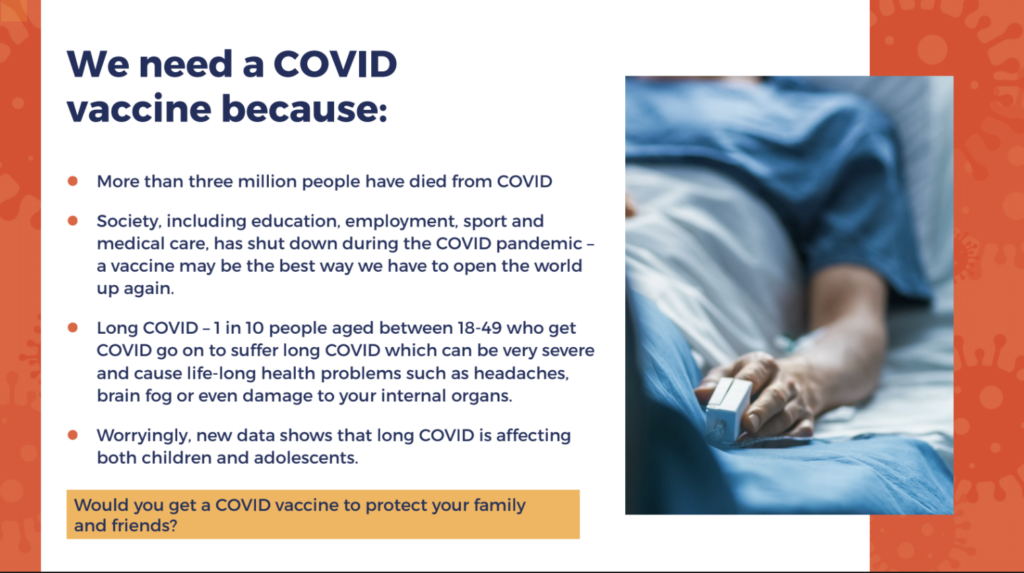
Resources use inappropriate emotional pressure
Materials purporting to be formal education materials about the COVID-19 vaccine are being delivered to children in classrooms across the country. Accurate information is crucial for them to make a considered decision along with their parents and carers. An examination of these materials is therefore wise to ensure that families are making an informed decision based on all the evidence available in a factually accurate and objective manner.
Several members of HART have written a letter to the MHRA expressing their “grave concern” over proposals to roll out COVID-19 vaccines to school children. In the letter, they warned it is “irresponsible, unethical and unnecessary” to jab children and urged the medicines watchdog not to “repeat mistakes from history”.
This is in line with what Lavine et al write in the British Medical Journal: “circulation of SARS-CoV-2 may in fact be desirable, as it is likely to lead to primary infection early in life when disease is mild, followed by booster re-exposures throughout adulthood as transmission blocking immunity wanes but disease blocking immunity remains high”.
Against this backdrop, it is concerning that materials for classroom use (produced by The Stephen Hawking Foundation and Hackney Borough Council) have been produced on the topic of COVID-19 vaccination that appear to put undue pressure on children to consider taking a vaccine, which would go against all established principles of informed consent.
Critical thinking?
Critical reading and thinking skills are essential as identified in National Curriculum (‘NC’) requirements. Secondary pupils in England and Wales, need to develop critical reading skills in order to examine how use of language in written content ‘presents meaning’. Pupils must also be taught to make ‘an informed personal response’ finding evidence for their point of view using skills of inference. They also need to recognise ‘other possible responses’ and evaluate these.
Children should not be passive consumers of information and believe all printed text is factually correct. This is a cornerstone in the education of a young person, which accords with the government’s Prevent agenda too. As the government guidance document warns, extremists are promoting disinformation and misinformation and so we need children and young people to be alert to such views. Otherwise they are at ‘increased vulnerability to radicalisation’ through propaganda. Teachers must ‘help develop their pupils’ critical thinking skills’.
It is not the premise of this short article to provide a detailed analytical scrutiny of those materials; such critiques already exist. However, attention should be drawn to the most prominent examples of overt persuasion and poor quality teaching in these materials. Consider the following slide:

Almost each of the (arguably dubious) statements made above are subject to challenge and have not been provided with appropriate context, but nevertheless they are used to ask a loaded question that contradicts the principles of informed consent: “Would you get a COVID vaccine to protect your family and friends?”.
This is a closed question requiring a binary answer — poor practice in education as it does not engage higher order thinking skills or require an evidence base to draw upon to justify the answers. How would a COVID vaccine protect your family and friends? What are the risks?
The use of the phrase ‘friends and family’ applies emotional leverage in a cynically persuasive manner similar to recognised propagandist materials. How can a child in a public learning environment answer ‘no’ to such a charged question? It could be deemed simply poor teaching at best, or coercive control at worst.
An appropriate approach?
The Human Medicines Regulations 2012 (the ‘Regulations’) apply to anything ‘designed to promote the … supply … or use of that [medicinal] product’, which according to the regulations amounts to an advertisement. As the materials do not properly encourage critical thinking and present information as fact without substantiation, it is entirely possible that the teaching materials and lessons delivering those materials amount to an advertisement and may constitute an offence.
The Regulations prohibit advertising medicinal products that are directed principally at children and prohibit using pictorial representations of changes in the human body caused by disease (which the Stephen Hawking materials do) that are likely to cause alarm. They also state that any advertisement must encourage the rational use of the product by presenting it objectively and without exaggerating its properties. Any advertisement must be clear that it is an advertisement (which the educational materials do not make clear) and state the name of the medicinal product. The slides make no specific name of the vaccines being referred to. The Regulations also contain specific requirements to include an express and clear invitation to read the instructions on the package/package leaflet.
One could even go as far as to say that it is uncertain whether a teacher using these materials would be failing in their statutory duties to provide a suitable and satisfactory education for their pupils, or even that they are in breach of the Regulations.
Recommendation
However well meaning these materials might be, it appears that they have at least the potential to put emotional pressure on children and — potentially — coercively control children’s decisions in relation to the vaccine. The materials are therefore incompatible with the NC and the government’s advice on Teachers’ Prevent Duty, which are there to help protect children.
It is therefore HART’s recommendation that these materials should be withdrawn from use as soon as possible.


